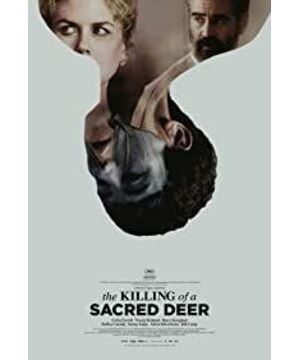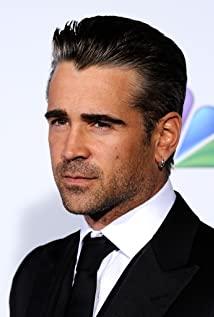The Greek director Lance Moss has been known to many people for his two works, "Lobster" and "Dog Tooth". He has exerted his unique control ability in black humor + dystopia, bringing us all weirdness. Unique world. In Lance Moss’ new work "Death of the Sacred Deer" this year, the elements of dystopia and black humor were discarded together, and replaced by a darker and more realistic (excluding supernatural elements). Realistic background) thriller movie.
A heart surgeon got acquainted with the son of a deceased patient because of an operation, or out of guilt or desire, the doctor began to have an intimate relationship with the 16-year-old boy. But this kind of relationship became more dangerous and difficult to control after the teenager came into contact with the doctor's family. The boy's mother began to admire the doctor, and the boy began to permeate the doctor's family. Soon, the doctor’s family began to suffer from strange illnesses. The teenager claimed that all this was his revenge for his father, and that the doctor’s mistake in the operation took away his family, and he now wants the doctor to taste that. . Three of his family members will suffer from malaise and bleeding, and the doctor can only save the rest of the family by sacrificing one of them. After all attempts failed, the doctor finally closed his eyes and killed his youngest son.
The title "Death of the Holy Deer" actually comes from ancient Greek mythology. Iphigenia is the most beloved daughter of Agamemnon, the commander of the Greek coalition forces. One day, Agamemnon went out hunting, but accidentally injured the pet red deer of the hunting goddess Artemis . He had to make a choice between stopping the Trojan War or sacrificing his daughter. In the end, he made the same decision as the doctor in "Death of the Deer" —sacrificing his youngest child.
San deer of the referenced by no means goddess of the hunt red deer, but伊菲吉妮娅(Iphigenia), is the story of a small son . The youngest is a whole family in the purest man - evil intentions father, mother feeling, even my sister came home after the teenager had also been contaminated (leaving aside her coat off but was rejected juvenile implied mentally For the loss of her virginity, we can see that her daughter has begun to speak like a teenager three times when facing death, and put a cigarette on the window calmly). The sacrifice of the purest person, in exchange for the living and eternal guilt of the filthy heart.
Although even Lansmos personally admitted in the interview that the theme of "Death of the Sacred Deer" is revenge , we can still see the wealth of information hidden between the lines.
The first is the role of the doctor. From the beginning of the conversation between the doctor and the anesthesiologist, to the watch sent in the next scene, it is difficult to make people wonder whether the relationship between the doctor and the teenager is only between the doctor and the patient or ordinary friends. Later, the doctor hoped that the teenager would not come to the hospital on his own so as not to be seen by others, and also hoped that the teenager would come to his own home as a guest. Perhaps such a relationship started because of guilt, but for the doctor at this moment, it has already become a dangerous relationship driven by desire. And when the teenager once again went to the hospital to take the initiative to find a doctor for a heart examination, and made a strange request to check the doctor’s armpit hair, on the one hand, it is a challenge to patriarchy , and on the other hand, it can almost be regarded as a sexual relationship . Vaguely expressed.
In the second act, when the doctor wanted to know the cause of the strange illness from the youngest son, he offered to exchange secrets.
"When I was your age, I just started masturbating, I just started ejaculating. Only a little bit, almost a drop. I am still worried about whether there is something wrong with me, because I heard a lot of stories in school. Then there are One day, my dad drank a lot of alcohol. My brothers all went out. Only my dad slept in the room alone. I slipped in, put my hand on his penis, and then started to fuck him until he ejaculated. There were all sheets, I was scared and ran away."
It is not difficult to see that the doctor 's worship of patriarchy and the change in sexual orientation caused by the fear of sexual impotence since childhood , and the opposite of which is the silence of the youngest son. Maybe it was because his father’s secret frightened him, but in this scene, I think he showed another meaning: because the younger son is pure , even if compared with the father of the same age, he has nothing to hide. of.
——Now it’s you, tell me a secret.
--I have no idea. I have no secrets.
--impossible. There must be.
--I do not have.
The doctor’s fear of impotence led him to do everything he could to control the experience of patriarchy. From the very beginning, the teenager showed disdain and resistance to such a desire for control. When the doctor bought the watch for him, he emphasized that "I bought you a metal watchband with more money", but the teenager quickly changed to a leather watchband, even broke into the hospital without permission, ignored the doctor's risk, and even took the initiative to expose it to the public. Before (the hospital is one of the main scenes in this work, but also a public space as opposed to the private concept of "home").
In the first meeting between the boy and the doctor, the boy said that he was late because his friend bought a new motorcycle. The doctor said, "I hope you bring a helmet." This scene is actually after his daughter was riding on the boy's motorcycle. The conversation with the family echoes. The same is "I hope you bring a helmet", but the daughter is duplicity, it is not difficult to imagine the authenticity of the boy's words. This is the resistance brought after the teenagers began to invade this family structure, like a virus, slowly disintegrating this once-stable structure. When the doctor and the boy were walking along the river, the boy once said that he did not have many friends, but his mother was his best friend. We have every reason to believe that the boy’s excuse for motorcycles was fictitious from the beginning, and the purpose was in this conversation. Resist the doctor's control and seize the initiative .
In contrast, the mother played by Nicole Kidman is more savvy. In the first half of the film, she always maintains a weird and strange smile. Under the expression of a non-smiling smile, the audience has absolutely nothing. Reasons to believe that she has never been deceived by the doctor's lies, but is always tacitly tacit. It can even be said that the role of mother is actually one of the most horrifying elements in the first half of the film. There was no surprise even when he learned that the husband and the boy had been dating for nearly half a year, instead there was only a " reasonable " complex expression.
After learning about the boy’s death prediction, she hardly made any resistance. She just intuitively believed that they had nothing to do with the boy’s revenge plan, and she did not engage in a meaningless struggle like her husband (especially when she witnessed the unspeakable revenge plan). After the supernatural elements).
She discussed with her husband that they could kill a child and they could have another child, but because this scene is in a sequence of " everyone is surviving, the father chooses ", it is not so much a comfort to her husband under the premise of having to make a choice. It's more like begging her husband (under such conditions, the identity of her husband has become the judge of life and death) to let herself live, but she has no hesitation in sacrificing her own flesh and blood to make herself alive.
But at this moment, she was no longer the original expression of "everything under control", and a desperate expression exuded under the locked face. She did not hesitate to sacrifice one person, but she was powerless in the face of death. She didn't want to die, even if the price was to sacrifice her own children. In the basement, she cleaned the young man's wounds and kissed his feet. This echoed the previous husband's angrily throwing away the young's mother's hand, forming a sharp echo and contrast.
The first sister was pure, and the pollution she suffered was brought by the teenager. The beautiful singing voice implies the purity of the girl, but when she finally stood in the center of the choir, she suddenly became sickened, I am afraid it was not that she was hinting something. The girl lying in the hospital bed began to curse her mother secretly, and silently placed a cigarette in a wheelchair. At this moment, the girl had already become a vassal of the boy and was secretly sinking. The scene of the girl taking off her coat does not refer to the girl's physical , but the mental loss of her virginity . When she realized that begging her parents was too variable, she turned to the teenager for help. (If the role of the father at the moment is the judge, then the boy is closer to the god, Artemis)
At this moment, she is not only praying for the mercy of the gods as a dying person, but also an attempt to use their relationship (the "sentiment" between her self-confidence and the teenager) to ask for the right to live, even at this moment. Her feelings for teenagers have long been alienated into hatred. The behavior of the girl is inspired by her mother, but the purpose of the two is completely different. The former hopes that the youth will save themselves, while the latter hopes that the youth will give up revenge and save everyone. At this time, the sister has reached the extreme point of depravity. In the scene of the basement, her front face is always in the shadow, showing a strange expression that is completely different from the previous one.
If the juvenile is the external cause of the depravity of the sister, then the embarrassment of death is the predicament that stimulates the true human nature of the sister, that is, the inducement. Dilemma is the factor that inspires the true character of the character, and the entanglement of death presents us a Rashomon belonging to this family.
Among all the family members, the younger brother has the least ink, because the structure requires that the character must be pure, even if he does not seem to be exactly like this, even if such a character is difficult to exist in reality.
And the boy is the real shocking thing about the whole film. After showing various relationships and ways of doing things that were extremely uncomfortable in the first half, he changed dramatically into the role of Artemis in the second half. Only after the teenager reveals his plan, can the audience truly understand his intentions in the first half of his actions and speeches. On the other hand, it can be said that the teenager is playing the protagonist of a classical revenge tragedy with a different perspective (perhaps a deconstruction of the classical revenge tragedy) at this moment. He is insane, beckoned by the undead (father's death), disguised and deceived, obsessed with sexual desire and passion for revenge, but he is both a depressed hero protagonist and a sinister and cunning villain. . And the method that the teenager makes the family sick with is McGoffin in this story. (MacGuffin MacGuffin means a certain setting/event used to promote the plot, but it often lacks internal relevance and importance to the characters and the plot. As the plot of the story develops, gradually the characters themselves are loyal Or love, hatred, and hatred become the focus of the audience. McGoofen gradually becomes less important, sometimes even not at all.) The method is no longer important, it is just a supernatural element that cannot be resisted.
If "Lobster" can constitute a (dy)utopia after extremeizing a certain social practice, it can trigger the audience to discuss the reality of society in the form of fable, then "Death of the Deer" is just a pure opposition to Euripides. The imitation of Sri Lanka's tragedy brought this classical routine into the modern context, and it collided with new sparks.
But the problem also arises from this. For audiences who are completely unable (unwilling) to understand the theme of the film, this is undoubtedly an obscure work; but for audiences who can understand the basic intentions of the director, this is undoubtedly a wrap-around work. Works of myth/religious metaphors and layers of conspiracy, but the amount of information contained in such a story itself is far greater than the depth and breadth of the final theme . Revenge in the same way, an eye for an eye, a tooth for a tooth, murder for life.
I believe that all ancient Greek dramas have modern significance because they directly refer to human nature. --Michael Koyannis
The director of "Iphigenia", Koyannis, also a Greek director, said so. Homomorphic revenge is an everlasting theme of mythology, and it directly refers to the most fundamental human nature . But whether such a subject matter is too common and simple today is a question worth pondering. Under the complex and gorgeous form is a slightly simple and crude theme, which seems to make people feel a little disappointed. Perhaps the obsession with the tragedy of Euripides has somewhat restricted the development of the work itself, which is a pity.
The guilty person is not only a doctor, but the anesthesiologist also refuses to admit his mistakes and is driven by his own desires. However, such a scene came to an abrupt end after pushing the plot, and became a purely functional scene. And perhaps because he was too afraid that the audience would fail to understand, Lance Most arranged for the young man to bite the doctor and then bite his own flesh, shouting " This is a metaphor " three times , to those who can understand the subject. In other words, it is a bit too straightforward and embarrassing .
"Death of the Sacred Deer" is successful in form and very successful; although the core is not bad, the theme that does not match the complexity of the superficial story is still a pity. In general, this is an excellent work. Even if there are flaws, it is still very wonderful. It is worthwhile for me to write these four thousand words to analyze it. It is also worth the audience to continue to play after reading it .
View more about The Killing of a Sacred Deer reviews











